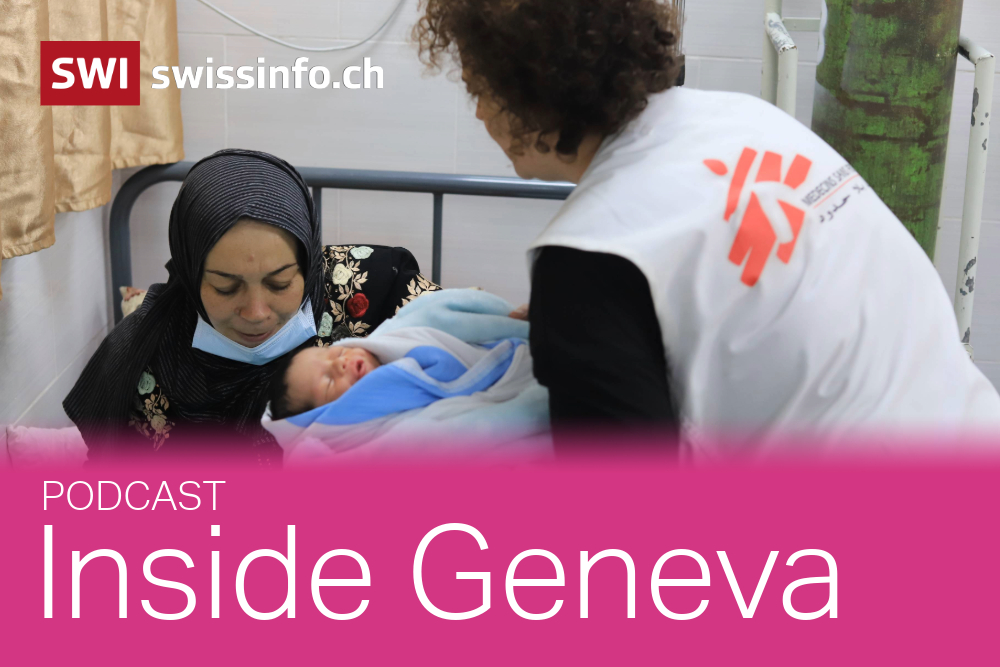Inside Geneva – medical help in war zones
Who are the people who live in Geneva, but spend their time focused on distant, far less peaceful places? The people who have committed themselves to trying to bring relief to the most intractable conflicts and crises? These are some of the people we are profiling in our summer series on the Inside Geneva podcast.
Some work for organisations you may never have heard of. Others, like this week’s guest, lead one of the world’s most famous. Chris Lockyear is Secretary General of Médicins sans Frontières (MSF), an organisation which provides medical care in wars, epidemics, and disasters.

More
Summer profiles: challenges in humanitarian aid with MSF’s Secretary General
The English translation is “Doctors Without Borders”, but Lockyear isn’t a doctor. “I trained as an engineer…probably not a very good one,” he laughs when I meet him at MSF’s headquarters in Geneva.
So how did he get involved? Word of mouth, he explains. A friend came back from a mission with MSF and told Lockyear: “This would suit you.” Not long afterwards, Lockyear was off to his first posting, in Darfur, Sudan. It was 2005. Not exactly a gentle introduction, during a conflict in which 200,000 people died.
Lockyear admits he went because “it seemed exciting”, and that, at the time, he knew “very little” about humanitarian principles. But his initial six-month posting stretched to a year and a half, and he remembers exactly the moment, one day as he was building a shelter to house a feeding centre, when he realised he was in the right job.
“As I was building the shelter, I realised that for the first time in many years I hadn’t thought about what was coming next. I wasn’t thinking every day: where do I go from here, what do I do, what’s my plan? I’d just been so absorbed in the work.”
A population trapped
After Darfur, Lockyear went to Somalia, where, working in Mogadishu to set up a cholera treatment centre, he experienced his first close-quarters car bomb. “We felt the impact through the ground,” he remembers.
Yet what made the biggest impact on him was not the threat to his own safety, but the fact that civilians in Mogadishu were trapped. The fighting was intense, and they wanted to flee, but the city was besieged. Describing it as “terror upon terror” Lockyear says he “couldn’t get my head around” the idea that civilians, so fearful for their lives that they were ready to abandon their own homes, could not do so.

More
International Geneva
Which brings me neatly to my next question for Lockyear, because nowadays, although based in Geneva, he spends a good deal of his time visiting MSF field operations – including, this year, Gaza, where civilians are also trapped. MSF has been outspoken about the way this conflict is being conducted, and in our interview, Lockyear is blunt and unapologetic about what he calls “wilful” violations of international humanitarian law.
“What are we on now, 37,000 people killed? It’s astonishing. Neighbourhood after neighbourhood after neighbourhood which has been completely flattened.”
Like the UN aid agencies, MSF too is frustrated by the challenges of getting aid supplies into Gaza. Lockyear describes a misrepresentation, an “instrumentalisation” of what aid delivery in a conflict zone actually involves. To get aid to where it’s needed, he says, is a “hugely complex operation” involving much more than just trucks crossing a border, or a few aid drops.
Do you want to read our weekly top stories? Subscribe here.
Lockyear fears that the reassurance the outside world receives from seeing a few aid deliveries is a worrying oversimplification of the situation in Gaza, and is even being used as a justification to continue the conflict. It’s a false narrative, he suggests, to say: “Look – humanitarian assistance is going in, therefore it must be a reasonable intensity of conflict.”
The politicisation or instrumentalisation of the conflict, and the role of aid agencies in Gaza, could, he worries, impact humanitarian work in all sorts of contexts, from Ukraine to Sudan. ‘‘What does it mean elsewhere? How could this be translated into other countries? Into Sudan, into the future, if we can operate as a world with such impunity? Where does that leave us?”

More
‘In Gaza, humanitarian workers are not heroes, but victims’
These are big, long-term concerns which all humanitarian agencies are reflecting on right now. But more immediately, I wonder how working in a context like Gaza impacts Lockyear and and his staff personally. He recently told the UN Security Council that MSF teams in Gaza were encountering children as young as five who were so traumatised by what they were experiencing that they said they wanted to die.
Lockyear takes a while to answer, and finally tells me about a man he met in a hospital, seeking care for his two badly burned children. While talking with him, it emerged that the man’s wife, and three further children, had been killed. “If that doesn’t motivate you to continue, then what can?”
It’s a fascinating interview which you can hear in full on the Inside Geneva podcast.
Edited by Reto Gysi von Wartburg/livm
For more insights and discussions from Switzerland’s international city, subscribe to Inside Geneva on Apple PodcastsExternal link, SpotifyExternal link, or wherever you get your podcasts.

More
Inside Geneva podcast
For more audio content from SWI swissinfo.ch, explore The Swiss Connection, a podcast highlighting Swiss stories for the world.

More
The Swiss Connection Podcast: Hear Swiss science stories for the world

In compliance with the JTI standards
More: SWI swissinfo.ch certified by the Journalism Trust Initiative









You can find an overview of ongoing debates with our journalists here . Please join us!
If you want to start a conversation about a topic raised in this article or want to report factual errors, email us at english@swissinfo.ch.